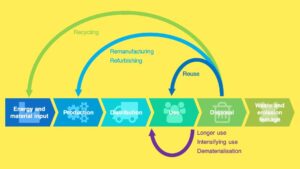As the year 2023 draws to a close and we are set to step into a new year, it’s time to take a look at how the year was for the Indian economy, in general, and for some of the key sectors, in particular. It goes without saying that the pandemic has radically reshaped the way we live and work in many ways. Governments and businesses reacted with speed and agility to keep societies moving forward as best as possible. But, a potential dilemma for business leaders is emerging.
The proliferation of remote working, combined with other possible factors, has created conditions ripe for potential data breaches, security compliance issues, and possible violations of digital ethics in the workplace. There is no doubt that digital technologies today play an increasingly important and complex role in modern society. They connect us with friends, colleagues and providers of essential services like doctors and banks. That has led to a growing interest in digital ethics in the workplace and elsewhere. The concept is simple. Just as “real-world” ethics govern the way groups and individuals treat each other, digital ethics guide the way we interact and resolve issues in the online world.
From data security issues, to the impact of artificial intelligence on jobs and society, there are a wide range of ethical concerns that require addressing in order to successfully use technology to our advantage. Ethics play an important role in the business world and ethical decision making and practices could be key for business success in today’s tech-driven world. Ethics in technology plays an important role in today’s world as it ensures that technology is used appropriately to benefit the society, without any unintended consequences and bias.
When it comes to the country’s BFSI sector, in particular, the sector, in the year gone by, has moved one step forward towards transmuting into a digital-first sector. Old-school banking and financial institutions are capitalizing on digital strategies to assess and engage with new and existing customers. Accelerated by the pandemic push, the industry stakeholders have expedited their digital transition efforts in front-facing and back-office operations. One has to keep in mind at this point that, India has the highest fintech adoption rate of 87 per cent compared to the global average rate of 64 per cent.
The implementation of digital transformation in BFSI has evolved more to enhance organizational business insights, lower operational costs, and accelerate workflows. The widespread demand for modern technologies, including artificial intelligence and machine learning among businesses, is projected to provide lucrative prospects for worldwide market advancement. But with these, came the issues of ethics. While technology certainly offers immense benefits and continues to evolve, it is imperative to consider the ethical implications of the developments.
In 2023, we have seen transformative changes sweeping through the Indian BFSI sector. It certainly requires a proactive response to the challenges and opportunities at hand. Advanced IT solutions emerge as the driving force behind this response, offering banks the means to overcome obstacles, meet customer expectations, and unlock new possibilities. The adoption of AI, blockchain, and cloud computing solutions plays a pivotal role in driving the technological advancement of the banking sector. These cutting-edge technologies enable banks and other financial services companies to streamline processes, automate tasks, gain valuable insights, and provide personalized experiences to customers. By leveraging these solutions, banks can enhance efficiency, improve risk management, and deliver tailored services that meet the diverse needs of their customers.
However, we should not forget the ethical issues associated with such aggressive technology adoption. For instance, one critical ethical issue AI poses is the concern of bias, as AI algorithms are based on training data that tend to have a human bias, therefore AI has the issue of inheriting the bias of its creators. Companies can carry out ethical assessments and identify potential ethical risks while implementing any new technology.
While businesses face several ethical challenges owing to the ever-evolving technologies and its fast-paced implementation, it is critical that they ensure personal data is protected and used appropriately.
Some of the critical ethical issues include:
Misuse of personal data:
With businesses gathering huge amount of our personal data from various internet sites such as shopping sites, social media or any other business platforms, etc., misuse of personal information becomes one of the primary ethical concerns. Having access to all our personal information could also be considered as a breach to our right to privacy and can lead to negative circumstances such as data breaches and cyberattacks. In some cases, our personal data can be misused for targeted advertising, shared with third-party partners.
Spread of misinformation:
There are high chances of it being misinterpreted or simply spread without fact checking. This kind of inaccurate or distorted information is capable of causing havoc in the society.
Lack of accountability:
There are often third-parties and shared technology involved. There arises confusion about which party is responsible for data governance. For concerns on big data, cybersecurity and other data being used by both parties, there is usually a lack of responsibility or even awareness.
Liability for autonomous technology:
While from the business perspective, technology adoption holds immense potential, however allowing programmed technology to control itself without human oversight can be concerning. Some level of human intervention is always needed for safety and ethical purposes.
AI bias & accountability:
AI also comes with its own set of ethical issues. AI technologies such as facial recognition, health tracking etc. result in risking our personal data and has the possibility of being misused.
Going forward, we would like to see companies carrying out ethical assessments and identifying potential ethical risks while implementing any new technology. This way they can mitigate risks and address ethical concerns proactively. Together, BFSI sector companies and technology partners should forge a path of transformation, bringing the vision of a technologically empowered and customer-centric BFSI sector to life.
The new mantra in the year to come should be:
‘Ring out the old
Ring in the new
Ring out the false
Ring in the new/ true’…………… Ethically and Efficiently.






















